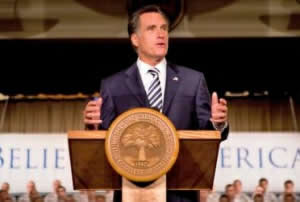Republican presidential candidates throw mud on the sun, economy
 Recently presidential candidate and presumable frontrunner, Mitt Romney spoke out against federal support for renewable energy, instead pushing to produce more coal, oil and natural gas domestically. His sentiment is echoed by the other candidates vying to unseat President Barak Obama. They’ve glommed on to the failure of DOE backed Solyndra, a move supported by the Bush Administration, as proof that the green economy is a failure, and the country should put it’s fossil fuel blinders back on.
Recently presidential candidate and presumable frontrunner, Mitt Romney spoke out against federal support for renewable energy, instead pushing to produce more coal, oil and natural gas domestically. His sentiment is echoed by the other candidates vying to unseat President Barak Obama. They’ve glommed on to the failure of DOE backed Solyndra, a move supported by the Bush Administration, as proof that the green economy is a failure, and the country should put it’s fossil fuel blinders back on.
They’re ignoring a lot of what’s been driving the country’s recovery—anemic though it is—and an industry with a promising future and an international leadership role for the U.S. Recently, I spoke with Colin Meehan, Environmental Defense Fund’s clean energy analyst—and incidentally my brother—about Romney and other Republicans’ campaigns and about how these attitudes don’t reflect how Republicans and Democrats are working together at the state level to pass bipartisan pro-solar and pro-renewable legislation—even in Gov. Rick Perry’s Texas, where my brother lives.
Romney’s “Believe in America” economic platform would gut support for renewable energy in the U.S. He also pledged to block pollution regulations. He’s called Obama’s support for green jobs an unhealthy obsession and blows smog on climate change science.
"My view is that we don't know what's causing climate change on this planet,…spending trillions and trillions of dollars [on it] is not the right course for us," The Miami Herald reported Romney said at a recent fundraiser.
That’s in stark opposition to his position as Governor of Massachusetts. “Two years ago Romney was saying humans contribute to global warming and that we need to do something about it. Now he’s saying he’d pull support for renewables, which he supported as Governor. So it seems like it maybe for political expediency,” Meehan said. “Romney’s energy plan, his stance on global warming, it shows this amazing ability to dismiss science when it’s inconvenient.”
It’s not just Romney. Other Republican candidates are taking similar stances.
“It’s amazing to me how the Republican presidential candidates so quickly dismiss science without looking at it,” Meehan said.
The candidates are sloughing off the results of decades of studies that show the impacts of climate change. This includes the preliminary conclusions of so-called climate skeptic Richard Muller’s “Berkeley Earth Surface Temperature” project, which found that climate change is real. That study was largely supported by the conservative Koch brothers through their Charles G. Koch Foundation.
The republican candidates are not only dismissing science, they’re dismissing the potential for the growth of a new industry.
“Clean tech is growing fast, and it’s new. The question is should we be moving forward as a country and subsidizing new, clean technology, or old, fossil fuel technology,” Meehan said. “There is ample evidence that the money that goes to renewable energy is incredibly effective and has worked. It’s driven and created jobs.”
A 2009 Environmental Law Institute study showed that between 2002 and 2008, the U.S. spent $72 billion on fossil fuel subsidies.
“The amount of money we spend on renewables is a drop in the bucket compared to what we give fossil fuels. And they’re experiencing record profits. The idea the we need to keep giving money to these companies with record profits is completely counterintuitive to a campaign that seem to be focused around jobs,” Meehan said.
During the same period the U.S. spent only $29 billion on renewables—at that point mostly for ethanol. Only $5.2 billion supported renewable energy production.



